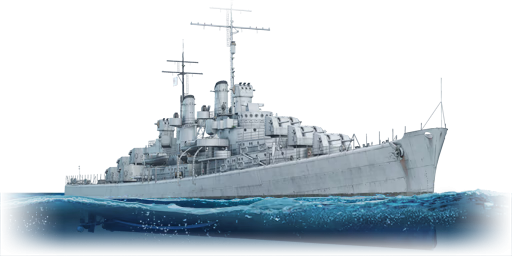Difference between revisions of "USS Atlanta"
godzilla5549 (talk | contribs) (added history from devblog) |
Colok76286 (talk | contribs) (→External links: Added Devblog) |
||
| Line 77: | Line 77: | ||
== External links == | == External links == | ||
| − | + | <!--Paste links to sources and external resources, such as: | |
| − | |||
* ''topic on the official game forum;'' | * ''topic on the official game forum;'' | ||
* ''encyclopedia page on the ship;'' | * ''encyclopedia page on the ship;'' | ||
| − | * ''other literature.'' | + | * ''other literature.''--> |
| + | |||
| + | * [[wt:en/news/6334-development-uss-atlanta-the-explosive-air-traffic-controller-en|[Devblog] USS Atlanta: The Explosive Air Traffic Controller]] | ||
{{USA light cruisers}} | {{USA light cruisers}} | ||
Revision as of 13:08, 11 March 2020
Contents
Description
The Atlanta-class, USS Atlanta (CL-51), 1941 is a rank IV American cruiser with a battle rating of 5.3 (AB/RB/SB). It was introduced in Update 1.91 "Night Vision".
General info
Survivability and armour
Ammunition storage severely lacks protection. Detonation of ammunition is commonplace, although the storage forward of the bridge does benefit from a layer of fuel storage in-between it and an incoming salvo. The turrets are equally fragile.
Mobility
Handling is surprisingly sluggish when stock. Despite the relatively low weight for a light cruiser, the Atlanta struggles to maneuver. Her rudder responsiveness is lethargic, and once a turn has begun, her speed dips into the 20-25 mph range. On some maps where scrambling to the island groups is necessary for lighter cruisers to evade enemy fire, the Atlanta can easily fall behind and find itself on the receiving end of heavy cruiser fire.
Armament
Primary armament
The primary armament of the Atlanta is eight twin five-inch guns, of which a maximum seven can be brought to bear on one target. These guns have a high rate of fire even with an untrained crew and have an acceptable quantity of high explosive per shell. The downside is a comparatively poor shell trajectory when compared to other cruisers; especially in fights over 8 kilometers, the five-inch guns require more precise distance input compared to larger diameter guns.
Secondary armament
Despite ostensibly being an anti-air cruiser, the only anti-air secondaries on the Atlanta are three quad 1.1-inch "Chicago Piano" mounts. They are reasonably well positioned on the ship with acceptable firing arcs, although their volume of fire is lacking.
Torpedo armament
Torpedo armament consists of six total torpedoes, three per side. The port torpedo launcher face the bow of the ship, while the starboard faces aft. This does not seriously affect usage or arcs of fire.
Usage in battles
The Atlanta is best saved for close maps like Arctic Port where her guns can eviscerate cruisers inside 6-8 km. On larger maps where cruisers engage at distances as far as 12-13 km, the Atlanta is a poor choice. She has neither the armor nor the guns to engage Hippers, Mogamis, Kirovs, or Brooklyns at longer ranges nor even the speed to place herself in a more advantageous position out of sight from the larger cruisers.
Pros and cons
Pros:
- Excellent close to medium range firepower by destroyer standards
Cons:
- Poor survivability
- Poor maneuverability
- Poor accuracy and weapon trajectory at longer range
History
Atlanta-class light cruisers came to being in the late 1930s, during which the US Navy was considering a multitude of different design proposals for new light cruisers, which would be in accordance with the limitations set by the Second London Naval Treaty of 1936.
Having realized that all outstanding requirements couldn’t be met with a limited displacement design, the decision was eventually made to adopt a smaller light cruiser design to act as a destroyer leader. As a result, the proposed design of what would become the Atlanta-class was selected for construction, with an initial order for four ships being issued in April 1939, followed by a second order for four further vessels in September 1940.
USS Atlanta, the lead ship of the class, was laid down on 22 April 1940 in Kearny, New Jersey and was subsequently commissioned into service in December of the following year, shortly after the US’ entry into WWII. Atlanta would soon receive its baptism by fire, taking part in the Battle of Midway in June 1942 while on screening duty for American aircraft carriers.
USS Atlanta also took part in heavy fighting during the Battle of the Eastern Solomons, as well as the subsequent Naval Battle of Guadalcanal. During the latter, USS Atlanta received mortal damage during a Japanese night attack, both from enemy as well as friendly fire. Although the USS Atlanta made it through the night, it became clear the next morning that the damage was too severe to deal with and the order for scuttling was issued on 13 November 1942. Atlanta was subsequently struck from the Naval Register in January of the following year.
- From Devblog
Media
Excellent additions to the article would be video guides, screenshots from the game, and photos.
See also
Links to articles on the War Thunder Wiki that you think will be useful for the reader, for example:
- reference to the series of the ship;
- links to approximate analogues of other nations and research trees.
External links
| USA light cruisers | |
|---|---|
| Omaha-class | USS Detroit · USS Raleigh · USS Trenton |
| Atlanta-class | USS Atlanta |
| Brooklyn-class | USS Brooklyn · USS Helena |
| Cleveland-class | USS Cleveland |
| Fargo-class | USS Fargo |
| Worcester-class | USS Roanoke |




